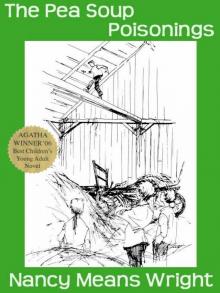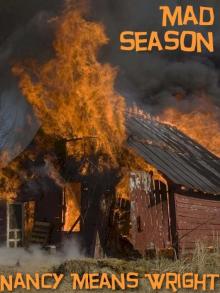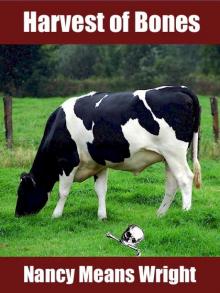- Home
- Nancy Means Wright
The Pea Soup Poisonings Page 6
The Pea Soup Poisonings Read online
Page 6
“She’s just a little kid,” said Kelby, coming into the room. He was wearing his Northern Spy Club badge, trying to look important. “She doesn’t know anything about anything,” he told the policeman.
“I do so!” she cried. “I know a lot about a lot!” Her voice softened when she saw the man lean forward. “I mean – other things. I’ve told you all I know, officer. Except...”
“Except?” the officer said.
“Except that Cedric had a beeper. It went off when they put Miss Thelma into the car. But he turned it off again so I couldn’t hear what it said. But it could mean he’s an ambulance volunteer or something.”
Kelby scoffed. “It could mean a lot of things. Anyone can wear a beeper. I could wear one.”
“Sonny, I’m talking to your sister,” said the officer. Kelby frowned and polished his badge with his bony knuckles.
“The officer is talking to me,” said Zoe, making a face at her brother. She wasn’t going to be intimidated by any badge. Although she wanted one terribly, she had to admit. “But there’s nothing more I can tell you, sir.”
“Well, now, if you think of anything more, let me know,” he said, smiling down at her, and she said, “Find him please. Find Spence!”
Kelby ran after the man as he was leaving and Zoe heard him say: “Bagley sisters. They’re the ones you should be investigating, officer –not my father or this man with a beeper. I mean, it was their pea soup. They were arguing, too. With Agnes Fairweather. Just before she died. And the sisters came over to our house to get cider. They could’ve stolen that insecticide from Dad’s barn.”
The officer said he might pay another visit to the Bagley sisters after he inspected the apple barn, and then he went out.
“Traitor!” Zoe hollered after Kelby, and she banged out of the house.
She ran back over to the Bagley sisters’ to warn them about the officer. “He shouldn’t see Miss Thelma here,” she told them, out of breath from running. “The police think she’s still at Rockbury. And Kelby thinks you were having an argument with Alice’s granny before she died. He made it sound suspicious.”
For a moment the sisters didn’t say a word. Zoe worried that there might have been a bad argument. But then the two burst out laughing.
“We argued over the pea soup!” Miss Maud said, and Miss Gertie said, “We always put in onions, and Agnes thought that onions spoiled the soup. We said the soup was dull, dull without it, didn’t we, Maud?”
“Absolutely,” said Maud. “The onions add personality. I mean, it isn’t as though Agnes is –was allergic to onions, oh no. She was stubborn, that’s all. She wouldn’t even taste the soup with onions, would she, Gertie? We put a bowl in front of her and she just sat there, staring at it. It was rather annoying.”
“No, she wasn’t an adventuresome person at all. And that’s why we sent over a pot of plain pea soup, no onions. But,” Gertie added quickly, “she was a lovely, sweet lady. We all had good times together, didn’t we, Maud?”
“Yes, yes, we did. Oh indeed, we did.” Miss Maud wiped away a tear with an embroidered hankie.
Miss Thelma came into the house then, with an armful of rosy colored flowers. “Alice picked them. She happened to see me in the garden. I know, dear,” she said to Zoe, “I shouldn’t have let anyone see me. But I saw Alice coming out of her house and I just needed a hug, oh, so badly! So I beckoned her over, and we both hugged and wept buckets.”
“It’s oleander,” said Miss Maud. “It’s a poisonous plant. But it has such gorgeous red blooms. Just don’t eat them, that’s all.”
“Or put them in the soup,” said Miss Gertie –“though once we almost did,” and both sisters giggled.
Alice popped through the door and everyone started talking and hugging at once until a police car pulled into the driveway and Miss Gertie hustled Thelma upstairs. Miss Maud brought out a pitcher of milk and fresh doughnuts and arranged the oleander in a vase. And they all sat down around the table as though they hadn’t a care in the world.
When the officer came in with his shiny badge and his ironed blue shirt, they looked up innocently. “The argument was over pea soup, officer,” said Zoe. Miss Maud explained again about the onions, and they all smiled. Except the officer. He was jotting down notes on a yellow pad. He looked serious. “The Community Players are putting on a show in town,” he said. “My wife is in it. It’s called Arsenic and Old Lace.”
Zoe had heard of that play; her parents had rented the movie version on video. It was about two old ladies who poisoned their gentlemen visitors with arsenic. “To put them out of their misery,” as they explained it.
Miss Gertie jumped up out of her chair to face the officer. Her face was as red as the oleander blooms. “I don’t care for the insinuation, officer. Not one bit, no. We don’t take in gentlemen callers, and Agnes Fairweather was a good friend and we certainly didn’t poison her!”
“Indeed not,” cried Miss Maud, standing up beside her sister. “You can’t judge a book by its cover, Mr. Policeman. We may look like the ancient ladies in that play but we’re not poisoners, oh, no! And I’ve a mind to sue you for implying that we are. Why, we were devastated by Agnes Fairweather’s death! All our old friends dying away. One by one.”
“One by one,” murmured Miss Gertie, sitting back down, looking tearful.
“First Agnes,” Miss Maud went on, “and now Thelma. Poor Thelma, her half sister. Who was responsible for taking her away? Think about that, officer. Find out what that person put in the pea soup!”
The officer colored; he stuck a tongue in his cheek. He scribbled something on his notepad. He was looking more sympathetic now. He admired the red oleander flowers in the vase. The sisters offered him a sugar doughnut and he looked longingly at it, but then refused. He had to get on, he said. There was work to do. A missing boy.
“It’s possible that it’s all connected: the kidnapping and Agnes Fairweather’s death. And Thelma Fairweather’s, um, departure,” he said, as though he was the first one to think so.
“Why, there’s a brilliant thought,” said Miss Maud, winking at Zoe, and the officer smiled and took the doughnut anyway. Miss Gertie wrapped it up for him in a yellow napkin. “And give these flowers to your wife,” said Miss Maud, pulling the rosy oleander blooms out of the vase. “But don’t let her put them in your soup,” she warned, “they’ll poison the lot of you.”
The officer looked startled. He waved away the flowers. He squinted his eyes at the sisters. But before he could say anything, his beeper went off. Zoe heard a crackly voice saying, “A blue car with the New York license MBV285 was spotted at the East Branbury Mobil station. Get out there at once.” The officer dashed out to his car.
Zoe looked at Miss Gertie and said, “I think you need gas in your car, don’t you?”
Miss Gertie looked confused at first, and then her eyes brightened and she said, “Yes. Yes, we do need gas. You’re so perceptive, Zoe. We’re off again then, are we?”
“And hurry,” said Zoe. “To the East Branbury Mobil!”
Chapter Seventeen
Tigers and Old Black Bears
Spence heard a door slam downstairs and then everything was quiet. Even the woman, Chloe, was gone – otherwise he would have heard the soap operas, the coffee grinder, now and then a curse when she tripped over a cat or a can opener didn’t work.
He tried the attic door for the hundredth time, but of course it was locked. There were bars on the two windows. Outdoors he could see no other signs of habitation, only a chimney poking up through the maple leaves. If there were people living next door, they couldn’t see him. Just in case, though, as he had done every hour since they brought him here, he waved his arms. He wrote HELP with a piece of chalk he’d had in his pocket. Once the woman had come up when he was at the window and he’d had to erase it quickly with his sleeve.
But no one came to rescue him. No one knew he was here. Not even his parents. Not even his friend, Zoe.
At f
irst he was mad at her for getting him into this.
If she hadn’t wanted to join that foolish Northern Spy Club...if he hadn’t said he would help...if they hadn’t gone to Rockbury and kidnapped old Aunt Thelma...if he hadn’t gone home to get the key for the blacksmith shop...if he hadn’t come back with it and stumbled on that pair...
But he had. He sank down on one of the dusty boxes that was piled up by the window. He had done all those things. And to tell the truth, it had been kind of fun. More fun than sitting home, practicing the cello. More fun than cleaning the bathroom and having his mother tell him it wasn’t done right, to do it over again – he’d forgotten to wash the soap dish.
Besides, he liked those old ladies, the Bagley sisters. He didn’t want them to go to jail. He didn’t want anyone hurting Alice’s aunt Thelma. She was a good sport, and a lot more fun than his own Aunt Beatrice, who wrinkled her nose when he played a piece on the cello and said, “So that was Mozart?”
And now he was useless. He’d been caught, and he couldn’t help Aunt Thelma or the Bagley sisters or Zoe.
He got up from the box, feeling restless. Then he realized he had sunk down into it; the top flaps had caved in. Curious, he opened it up. Inside were piles of letters. They looked quite recent, all with this year’s date. Oddly, they were from zoos. The New City Zoo, the Plum Bush Zoo, the Land’s End Zoo. What, he wondered, would the couple want with zoos? He hadn’t heard any animals in this house bark or snarl or growl. A cat maybe, but cats weren’t in zoos.
He opened up one of the letters.
Dear Mr. Wolfadder:
In response to your query, yes, we will be able to provide your wildlife park with an aging male lion and a female tiger. However, we have had other requests, so please let us know as soon as possible when and where to transport them.
Yours,
Walter S. Bayre
Spence opened up another letter. This time it was a wild boar and two twenty-year-old black bears. All being offered to the Wildlife Park. A third zoo would send along a seventy-year-old elephant and two elderly zebras.
Why did the kidnappers want old animals, Spence wondered. Because they were cheaper to buy? He couldn’t imagine. Where was this wildlife park located? And was Wolfadder Cedric’s surname? Well, it figured.
Just then he heard a car in the driveway, the back door clang. Quickly he rubbed off the new HELP message he’d chalked on the window, closed up the box and smoothed out the top so it wouldn’t look like he had broken into it.
Footsteps were click-clacking up the attic steps. They were Chloe’s, he knew the sharp heels. He stretched out on his mattress and shut his eyes. When she stood over him, he opened them a crack, and rubbed them as though he’d been sleeping the whole time.
“Here, kid. I brought you some soup and a hot dog for lunch.”
He sat up, blinked at her. She looked like a genie that had just stretched up out of a bottle of red ink. He narrowed his eyes at the soup. It was a dull green.
“Pea soup?” he said.
“Kid, this ain’t a restaurant. You eat what you get. You don’t want it, you can go hungry.” She click-clacked out on her red heels. Spence heard the door snap shut behind her.
He ate the hot dog, he had to keep up his strength. But he left the pea soup in the bowl.
Just looking at it made him want to throw up.
Chapter Eighteen
A Message at the Mobil Station
Three police cars surrounded the Mobil gas station, but there was no sign of the two-tone blue car. It had obviously gotten away before the police arrived. One by one the police cars rumbled off, and Miss Gertie started to follow. Zoe said, “Wait, please.” She wanted to ask the gas attendant a few questions.
The attendant was a teen-aged boy with a pimply face and hair the color of hay. He looked suspiciously at Zoe when she inquired about the car.
“It was here. I told the fuzz.”
“The who?” she asked.
“The cops,” he said, glaring at her as if she were stupid. “But it took off before they got here. I heard a beeper go off.”
“Oh! Did he answer the beeper? What did he say?” Zoe’s chest was doing a drum roll. Cedric, she figured, would have a cell phone.
“Who are you anyway?” The boy’s eyes narrowed. He stuck dirty hands on his hips, leaned forward to look in her face. He smelled of gas and garlic.
Zoe wished she had her Spy badge, but she hadn’t earned it yet. So she put her hands on her own skinny hips and said, “They abducted my best friend. Why do you think the police were here, anyway? If you don’t help, they’ll throw you in jail.”
The boy blinked his eyes, and scowled. “Yeah, he called back on his cell. I heard him when he paid for the gas. But I can’t remember what he said. I was counting the money. He paid in ones.”
“Try. Try to remember,” Zoe urged. “You want a boy’s death on your conscience?”
The boy furrowed his brow. He thrust out his lips like a goldfish. “Okay, he said something about ‘Meet me at the old lady’s at noon.’ Yeah, that’s what he said. Then he said he’d ditch that car. Somebody was on to him.”
“The police. That’s who was on to him.”
“Maybe.” The boy shrugged, and went out to gas up a red Blazer.
The old lady’s, Zoe thought. It could mean Thelma’s house. The kidnappers would search again for that key. If she hid in the house while they were searching, they might reveal Spence’s hiding place. And she could go to save Spence!
“Home, James,” she ordered Miss Gertie, and Gertie smiled and turned the car around. Then Gertie recalled that she really did need gas, and started to turn back. But it was already ten-thirty and Zoe was in a hurry to get home. “Please?” she asked. She had an idea about how to prove that the kidnappers were after the deed to the Alburg farm.
The car ran out of gas right in the sisters’ driveway. Zoe told Miss Gertie to call her dad, and he would bring along a canful. Her dad was fond of the old ladies. Miss Maud had taught him in school, too.
Zoe told Miss Thelma her plan, and Thelma grinned and hugged her. “We can make a copy of the deed,” she said, “but how will we do it? We don’t have a copier here.”
“My mom has one,” said Zoe. She ran up the street with the folded deed.
Kelby met her at the door. “What’s that in your hand?”
“Nothing. Just a drawing I did at the sisters’ house.” She held it tightly in her fist. She didn’t want her brother to see it. She didn’t want him to know she had evidence. Not yet.
“You told them what I said about the argument, didn’t you,” Kelby accused. “You ran right down and blabbed. You didn’t like to hear about that argument, did you? You know I’m right. That the sisters poisoned that soup. The officer came back here. He said they had a poisonous plant in their kitchen.”
“Really?” said Zoe, lifting an eyebrow. “What kind of plant?”
Kelby couldn’t remember the name. “Olee-something,” he said. “It would kill you just like that.” He snapped his fingers.
“Oh, scary,” said Zoe, and ran upstairs to her mother’s study. In a jiffy she made two copies of the deed and placed them inside a folder.
“Two and a half days. Two and a half days left to earn your badge,” Kelby warned when she came back down. He shook his head sorrowfully.
“I’ve been practicing,” she said. “I could walk that beam right this minute.”
“Sure you could.” He looked skeptical. “But you haven’t solved the crime. You won’t get the badge till you do. And,” he said, lifting his chin, “it looks like I’ve got the crime sewed up. That officer agrees with me. It’s definitely the sisters who did in Alice’s granny. They’re professional poisoners.”
“Is that so?” said Zoe. She watched him shuffle off to the kitchen. Then she called up Tiny Alice to ask her friend to meet her with the key to Miss Thelma’s house.
For good measure she brought along Spence’s tape recorder.
She’d found Spence’s parents still huddled by the phone, hoping for good news, or maybe a ransom call. But his dad waved her on upstairs when she asked to borrow the recorder. She could hide it somewhere in Thelma’s house, couldn’t she? She’d seen a TV show once where the police did exactly that and caught the bad guys.
“You could put it in a kitchen drawer,” Alice suggested when Zoe got there with the deed. “You can’t just leave it out or they’d suspect something. I mean, it wasn’t there before when they looked.”
Zoe thought that was good advice.
There were several papers folded up in one of the kitchen drawers. Zoe hid the folder between instructions for how to clean the oven and how to work the electric can opener. The relatives, if they really were relatives, would need an original deed to prove they owned the farm. And then, Miss Thelma said, they would have to show that Alice, her heir, was too young to run a farm on her own and that Thelma was mentally incapable of making her own decisions.
Or they could do away with her, Zoe thought, and panicked. She must catch the pair before they found Miss Thelma!
It was eleven-thirty and Zoe decided to wait in the house until the couple came.
“Can I hide, too?” asked Alice. “I can squeeze into a small space.”
“I’d like the company,” said Zoe, “but someone has to know what’s going on in case they get me. You never know.” She smiled, but her insides froze. Alice, too, was in danger, she realized. Although at least she had her mother to protect her. Alice’s mother wasn’t born a Fairweather. She probably wouldn’t know Fairweather relatives if she fell over them.
“How will I know if they get you?” asked Alice, biting her lip.
“Just watch the house. You can see it from your window, can’t you? And if your mother wants you for something or other, listen for the car and then run to a window. Tell her you’ve just seen a bluebird! I mean, it might not be a blue car. Cedric might have rented a different one. If I don’t come over to your house when they’ve gone, you’ll know they’ve got me.”

 Stolen Honey
Stolen Honey Broken Strings
Broken Strings The Pea Soup Poisonings
The Pea Soup Poisonings Mad Season
Mad Season Poison Apples
Poison Apples Harvest of Bones
Harvest of Bones